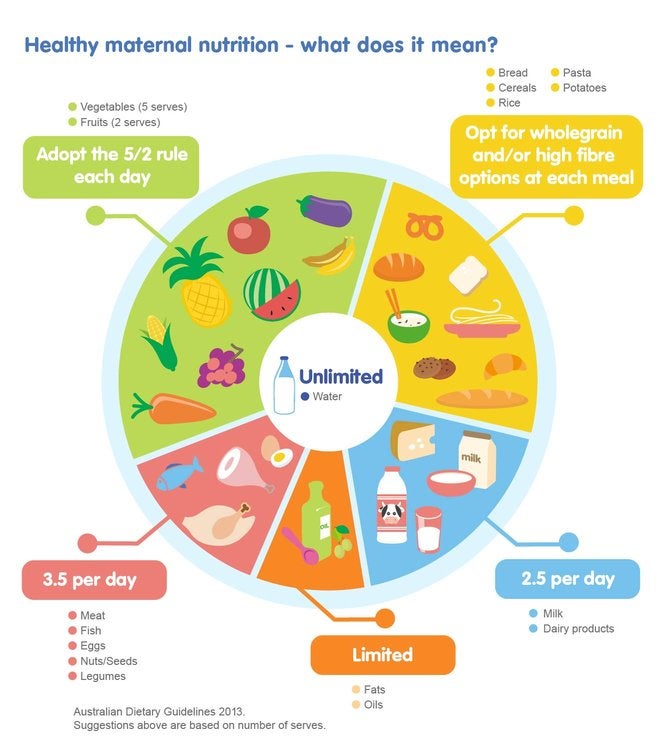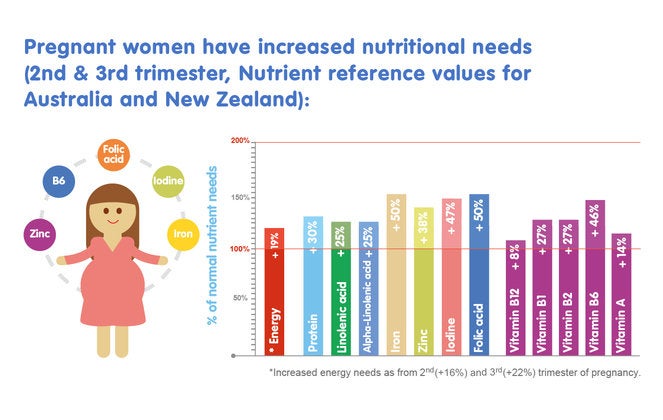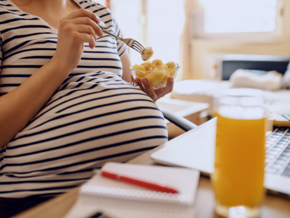
Your pregnancy diet not only supports your additional energy requirements (and satisfies those pregnancy cravings), but it also importantly fuels your baby’s growth and development. Make every kilojoule count by choosing nutrient-packed foods, in other words get more bang for your kilojoule buck. Focus on developing a pregnancy food chart that includes more of the good stuff – from the 5 food groups - proteins, vitamins and minerals, fibre, healthy fats, complex carbs and fluids, and less of the ‘not so necessary’ stuff – sweets, juices, high salty snacks.
In this article about your healthy diet for pregnancy, learn:
- What a good pregnancy diet looks like and what the best pregnancy foods to eat are, including the recommended servings of each food group;
- What nutrients, vitamins and minerals are important for your pregnancy diet and their effects on you and your baby’s health;
- 10 top tips for your pregnancy diet to help keep you on track;
- Unmasking myths around foods and pregnancy; and
- The answers to commonly asked questions about pregnancy food and pregnancy vitamins.
If you have any questions or special dietary requirements, talk to your healthcare professional to get tailored advice on your nutritional needs during pregnancy. If you are coeliac and are on a gluten-free diet, check out our guide on navigating a gluten-free diet during pregnancy.
What food to eat during pregnancy
What does a healthy diet for pregnancy look like?
These food group guidelines are an easy way to get started on a healthy pregnancy diet. Of course, your beginning weight, height, age, stage of pregnancy and the number of children you are carrying will determine how many kilojoules and how much and what type of foods to eat during pregnancy.
To get plenty of essential nutrients, eat a little of everything from the five food groups. Try for five serves of vegetables and two serves of fruit per day.

Vegetables and legumes/beans
5 serves/day
- At every meal
- Raw (washed) or cooked
- Fresh, frozen or thawed
During pregnancy, make sure that fresh vegetables are carefully washed to eliminate any soil traces either before cooking or before placing in a home-made salad. Cook frozen vegetables, do not eat them uncooked.
Fruits
2 serves/day
- Buy fresh produce in season where possible
- Limit fruit juices
During pregnancy, make sure you wash fresh fruit well before eating. Fruit juice is a concentrated form of fruit, they contain extra kilojoules and usually without the benefit of fibre.
Grain and wholegrain foods including breads, cereals, potatoes, rice and pasta
8.5 serves/day
- Choose high fibre varieties
- Use wholegrain cereals, breads and choose brown rice / pasta over white
- Go for a variety of grains: rice, wheat, oats, barley, quinoa and corn.
If you’re a coeliac and are trying for a baby, our guide ‘Eating Gluten-Free During Pregnancy: What you Need to Know’ can help you keep yourself and baby healthy during pregnancy.
Milk and dairy products
2.5 serves/day
- Go for variety
- Choose unflavoured products and opt for the best sources of calcium with the least fat and salt: milk, yoghurts etc.
During pregnancy, only eat pasteurised dairy products. Avoid soft cheeses unless served cooked and hot. Instead opt for hard cheeses (cheddar, tasty etc).
Lean meats and poultry, fish, eggs, nuts and seeds
3.5 serves/day
- Aim for smaller protein portions compared to the vegetables & grains (pasta, rice etc.) on your plate.
- Meat: try to eat a variety of different meats and choose leaner cuts.
- Fish: low- mercury, fish or seafood (salmon, shrimp, canned tuna, etc) are recommended at least twice a week, either fresh, frozen or canned.
A note on food safety
Fish: avoid smoked fish and seafood, fish from contaminated rivers, as well as fish that contains high levels of mercury (shark, swordfish, deep sea perch and catfish).
Meats: avoid cold cuts, pates, and liver. When cooking meat and fish, check the temperature to ensure the meat is well done.
Eggs: avoid foods containing raw eggs due to risk of Salmonella.
Fats and oils
Limit consumption
- Try to eat a variety of unsaturated spreads and vegetable oils (olive oil, canola oil etc.)
- Limit animal fats (butter, cream, etc.)
Healthy fats, in moderation, are good for you. Choose unsaturated fats such as olive oil and nuts, seeds, avocado and salmon for their omega-3 fatty acids.
Sweets
Limit consumption
- Try to limit sugary drinks (soft drink, sugary fruit drinks & nectars)
- Limit foods with a high fat and sugar content (pastries, pudding, ice cream, chocolate bars, etc.)
During pregnancy, try and go for fresh fruit instead of sweet treats (cakes, biscuits etc.) which are often empty kilojoules.
Drinks
Limit consumption
- Avoid Alcohol - During pregnancy and breastfeeding you should not drink any alcohol at all.
- Drink plenty of water - Drink tap water or bottled water during and in-between meals.
- Try to limit sugary drinks (soft drink, sugary fruit drinks & nectars).
- Limit caffeine intake to no more than 200mg per day (1 cup of espresso style coffee, roughly 2-3 cups of instant coffee or 4 cups of tea).
Salt
Limit consumption
- Use iodised salt.
- Try to limit addition of salt while cooking, and do not add salt before tasting (instead add some pepper or herbs for flavour).
- Limit salty foods: chips, processed snacks, condiments.
Physical activities
At least 30 minutes’ walk everyday.
During pregnancy, maintain your normal physical activity, except those which represent a risk of falling or injury. You should avoid any contact or competition sports. During pregnancy and breastfeeding, do not begin any new physical activity without checking with your healthcare professional first.
What nutrients, vitamins and minerals are important during pregnancy?

Here is a quick reference table which summarises what the key nutrients do and in which foods to find them.
| Nutrient | For | From |
|---|---|---|
| Protein | Important for growth and development of muscles and bones | Meat, fish, eggs, cheese, dairy |
| Carbohydrates | Supplies energy | Pasta, rice, bread, cereal, legumes, potatoes |
| Omega 3 DHA Fat | Important for baby’s brain and eye development | Fish, supplements |
| Probiotics | Contribute to a healthy gut flora | Probiotic product, such as probiotic yoghurts, supplements |
| Vitamins | For | From |
|---|---|---|
| Folic acid | Reduces risk of foetal neural tube defects | Dark green leafy vegetables, dried beans, avocado, fortified breads and cereals |
| Vitamin B1 (Thiamine) | Important for energy production and carbohydrate metabolism | Wholemeal products, fish, nuts, seeds |
| Vitamin B2 (Riboflavin) | Important for transport of iron and nervous system function | Dairy products, fortified breads and cereals, leafy green vegetables |
| Vitamin B12 | Important for red blood cell formation and nervous system function | Fish, meat, poultry, dairy, eggs |
| Vitamin C | Important for immune system, collagen synthesis | Citrus fruit, kiwi fruit, broccoli and sprouts |
| Vitamin A | Important for skin structure and visual function | Carrots, spinach (as beta-carotene), meat, full cream dairy products |
| Vitamin D | Building strong bones and teeth | Sunlight exposure on the skin, fish, eggs yolks |
| Vitamin E | Protects cells against free radical damage | Wheat germ/canola/olive oils, egg yolks, leafy green vegetables |
| Minerals and trace elements | For | From |
|---|---|---|
| Calcium | Important for bone and teeth formation | Milk, cheese, dairy products, bony fish, tofu |
| Magnesium | Regulates energy metabolism, nerve transmission, muscular contraction | Nuts, green vegetables, legumes |
| Iron | Important for oxygen transport and blood formation | Meats, fish, poultry, spinach, lentils |
| Iodine | Production of thyroid hormones and brain function | Iodized salt, seafood, bread |
| Selenium | Antioxidant, maintenance of hair and nails | Seafood, poultry, eggs asparagus |
| Zinc | Cell division, immune system | Meat, poultry, fish, brown rice |
Top tips for your pregnancy diet
Maintaining a healthy diet for pregnancy is crucial for mum and bub. Understanding the best dietary practices can empower expectant mothers to nourish themselves effectively and support their baby's growth. Here’s some of our top tips to help keep you on track:
1. Eat foods that satisfy you
Wholegrain cereals, legumes and pasta are high in fibre, which helps to bulk up a meal. Target these as snacks to help avoid reaching for a sugary snack mid-afternoon.
Meal and snack ideas: Enjoy wholegrain toast with peanut butter for breakfast, roasted chickpeas as a snack, and high fibre pasta at dinner – we have just the recipe for that!
2. Eat a little more… but don’t eat for two
It takes energy to develop a healthy baby and that energy comes from the food you eat. During your pregnancy, your energy demands will increase over time. There is no need to change your energy intake during the first trimester, then in the second trimester your energy needs will increase by 1400 kilojoules per day and 1900 kilojoules per day in your last trimester. To put this into perspective, the average adult should be consuming around 8700 kilojoules per day. So these additional kilojoule requirements in the 2nd and 3rd trimester means you don’t need to double your diet – it’s just eating a little more.
Having twins? Learn about eating for three.
3. Eat breakfast
It’s important to kick start your morning with a balanced and satisfying meal. Opt for a protein meal (egg, chicken, etc.), vegetables (tomatoes, mushrooms, etc.). Or cereal and milk to provide dairy for calcium, and wholegrain cereals. Finish with a piece of fruit.
Try one of these:
- 1 cup of milk with wholegrain cereal and some dried fruit + 1 small glass of freshly squeezed orange juice + 1 cup of coffee or tea (remember to limit your caffeine intake during pregnancy)
- 1 natural yoghurt with 1 sliced kiwifruit + 2 slices of lightly buttered wholegrain toast + 1 cup of tea.
If morning sickness has you feeling not quite up to your usual breakfast buffet, opt for something bland and easy to digest like lightly buttered toast and a banana, or a hard-boiled egg and a yoghurt. Check out some of our pregnancy diet breakfast recipes here.
4. Allow yourself one or two balanced snacks per day
Incorporate some ‘mini meals during the morning and/or afternoon to keep your energy levels up. Try to avoid sugary foods and instead opt for cereals, fruit and protein.
Try one of these:
- 1 cereal bar + 1 apple
- 1 slice of wholegrain bread + 1 small piece of cheese + a few strawberries
- 1 portion of natural yoghurt + 1 apple or small serve of hard cheddar cheese + some fresh fruit cubes.
5. Drink water
Drink about 9 cups (2.3L) of fluid per day while you are pregnant. This could be more if it’s summer during your pregnancy, or you live in a warmer climate. Opt for water rather than carbonated beverages and sugary drinks which provide empty kilojoules.
6. Eat fibre to keep you regular
Try prunes, wholegrain cereals, wholegrain bread, almonds, dried apricots, plus cooked green vegetables, which are easier to digest than raw. Fibre assists with alleviating irregular bowel motions, a common symptom of pregnancy. Buy fruit and vegetables as fresh as possible and minimise their processing before eating (ie. Blending, pureeing, overcooking) to get the maximum benefit from the fibre within.
7. Ensure you’re getting enough folic acid
Folic acid You can help to prevent one of the most common types of birth defects – neural-tube defect – by consuming enough folic acid (vitamin B9 supplement) before and during the early stages of your pregnancy. Speak to your healthcare professional about a folic acid supplement. Folate, a natural source of vitamin B9 is found mainly in fruit and vegetables (especially leafy green vegetables), legumes, nuts, fortified breads, cereals and juices.
8. Feed yourself Calcium for bones and teeth
Your calcium needs are up to 1000 mg per day during pregnancy. Consuming plenty of milk and milk products will help to support both your calcium needs and the calcium needed for your baby as their body develops. It’s important to take in vitamin D (through sunlight exposure) with calcium-rich foods to help your body absorb them.
9. Pump up your Iron
Fatigue may be the result of iron insufficiency or deficiency. To ensure you’re getting enough iron, consume a healthy diet that includes lots of iron-rich foods, such as lean meats (especially red meats) and green leafy vegetables, as well as an iron supplement, if your doctor recommends one. Iron is the main component of haemoglobin, bringing oxygen to the cells. Your requirements are 27 mg per day during pregnancy.
Vitamin C helps your immune system function properly and improves iron absorption. To get enough of it, eat fruit and vegetables every day.
10. Indulge yourself a little
It’s a special time and you should enjoy it! So give in to some of those cravings occasionally– just make sure you watch your diet overall.
Unmasking myths around foods and pregnancy
Unmasking myths around the best pregnancy foods or the most healthy diet for pregnancy is essential for expecting mothers to make informed pregnancy food choices that promote both their health and their baby's development.
Pregnant women crave pickles and ice-cream
Maybe. Particular food cravings may occur, but are not universal. Cravings are very common in pregnancy, especially for foods that provide energy and calcium, such as milk and other dairy products.
Pregnant mothers must eat for two.
False. Pregnant women do need to eat a little extra – but not twice as much! The main thing is to eat a well-balanced diet from all the food groups, so you get all the right nutrients. It’s only in the second and third trimester where your energy needs will increase slightly.
Pregnant mothers shouldn’t consume fish and fish oil.
False. Fish is an important part of a healthy diet and contains high-quality protein and other essential nutrients, such as omega-3 fatty acids. Fish is also low in saturated fat. Some fish can contain higher levels of mercury that may harm an unborn baby or young child’s developing nervous system. The best approach is to eat fish lower in mercury, such as prawns, canned light tuna and salmon. Limit those that contain higher levels of mercury (e.g. shark, swordfish and mackerel).
Drinking coffee has a negative effect on pregnancy.
False. Coffee in small amounts does not affect your baby, but avoid drinking more than three cups a day (200-300mg or less per day). Very large amounts of caffeine may result in a baby with low birth weight.
Frequently asked questions about pregnancy food
Which fruit is good for pregnancy
During pregnancy, several fruits are particularly beneficial due to their nutrient and fibre content. For example: bananas (rich in potassium and vitamin B6); berries (strawberries, blueberries, and raspberries are high in antioxidants, vitamins, and fibre); oranges (packed with vitamin C and hydration, they aid in the absorption of iron); avocados (high in healthy fats, folate, and potassium); and apples (another great source of fibre and vitamin C). Incorporating a variety of these and other fruits into your diet can provide essential nutrients for both you and your baby.
What foods to eat when pregnant
Focus on a balanced diet rich in fruits, vegetables, whole grains, lean proteins, and dairy. Foods like leafy greens, berries, nuts, and legumes provide essential nutrients for both you and your baby’s development. Aim to eat foods from all five different food groups to ensure a balance of nutrients are consumed.
What to avoid eating when pregnant?
There is quite a list of foods to avoid during pregnancy such as raw or undercooked seafood, eggs, and meats, as well as unpasteurised dairy products and certain fish high in mercury. These can pose risks to your baby's health.
What is the best drink during pregnancy?
Water is the best choice during pregnancy, keeping you hydrated and supporting your body’s increased blood volume. Aim for at least 8-10 glasses a day, or more if you live in a hot climate.
Sources
- NHMRC NRVs. Available at https://www.nrv.gov.au/dietary-energy.
- Australian Dietary Guidelines. Available at Healthy Eating When You’re Pregnant or Breastfeeding | Eat For Health.






